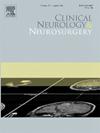Exploring the link between clinical, cognitive status, and telerehabilitation experiences in multiple sclerosis: A cross-sectional study
IF 1.8
4区 医学
Q3 CLINICAL NEUROLOGY
引用次数: 0
Abstract
Purpose
Evaluating the opinions of patients with multiple sclerosis (MS) about telerehabilitation services and investigating them in detail about their clinical and cognitive status is important for determining and discussing the expectations related to telerehabilitation. The objective of this study was to evaluate the opinions of patients with MS about telerehabilitation services and to correlate these opinions with the clinical and cognitive status of the individuals in question.
Methods
A prospective cross-sectional study was conducted with 101 individuals with MS. All participants were evaluated with the Multiple Sclerosis Impact Scale (MSIS-29), Cognitive Reserve Index questionnaire (CRIq), Telemedicine Patient Questionnaire (TPQ), Telemedicine Satisfaction and Usefulness Questionnaire (TSUQ), Telerehabilitation Beliefs Questionnaire (TBF).
Results
TPQ was weakly correlated with MSIS-29 Physical (r = -0.249, p < 0.05), MSIS-29 Psychological (r = -0.339, p < 0.001) and CRIq-Education (r = 0.257, p < 0.001). TSUQ was only weakly correlated with CRIq-Education (r = 0.205, p < 0.05). TBF was weakly correlated with MSIS-29 Psychological (r = -0.209, p < 0.05), CRIq-Education (r = 0.344, p < 0.001), CRIq-Work (r = 0.242, p < 0.05) and CRIq-Total (r = 0.260, p < 0.001). There was a weak positive correlation between TBF and the participant's age (r = 0.219, p < 0.05).
Conclusion
The views of individuals with MS on telerehabilitation were mostly related to psychological and cognitive (education-related) parameters. Age, educational status, and psychological level should be considered during telerehabilitation services in people with MS.
探讨多发性硬化症的临床、认知状态和远程康复经历之间的联系:一项横断面研究
目的评价多发性硬化症(MS)患者对远程康复服务的看法,详细调查其临床和认知状况,对确定和探讨远程康复相关期望具有重要意义。本研究的目的是评估多发性硬化症患者对远程康复服务的意见,并将这些意见与相关个体的临床和认知状况联系起来。方法对101例多发性硬化症患者进行前瞻性横断面研究,采用多发性硬化症影响量表(MSIS-29)、认知储备指数问卷(CRIq)、远程医疗患者问卷(TPQ)、远程医疗满意度与有用性问卷(TSUQ)、远程康复信念问卷(TBF)进行评估。ResultsTPQ弱与MSIS-29物理相关(r = -0.249,p & lt; 0.05),MSIS-29心理(r = -0.339,p & lt; 0.001)和CRIq-Education (r = 0.257,p & lt; 0.001)。TSUQ与CRIq-Education仅呈弱相关(r = 0.205,p <; 0.05)。TBF弱与MSIS-29心理相关(r = -0.209,p & lt; 0.05),CRIq-Education (r = 0.344,p & lt; 0.001),CRIq-Work (r = 0.242,p & lt; 0.05)和CRIq-Total (r = 0.260,p & lt; 0.001)。TBF与参与者年龄呈弱正相关(r = 0.219,p <; 0.05)。结论多发性硬化症患者对远程康复的看法主要与心理和认知(教育相关)参数有关。MS患者远程康复服务应考虑年龄、学历、心理水平等因素。
本文章由计算机程序翻译,如有差异,请以英文原文为准。
求助全文
约1分钟内获得全文
求助全文
来源期刊

Clinical Neurology and Neurosurgery
医学-临床神经学
CiteScore
3.70
自引率
5.30%
发文量
358
审稿时长
46 days
期刊介绍:
Clinical Neurology and Neurosurgery is devoted to publishing papers and reports on the clinical aspects of neurology and neurosurgery. It is an international forum for papers of high scientific standard that are of interest to Neurologists and Neurosurgeons world-wide.
 求助内容:
求助内容: 应助结果提醒方式:
应助结果提醒方式:


